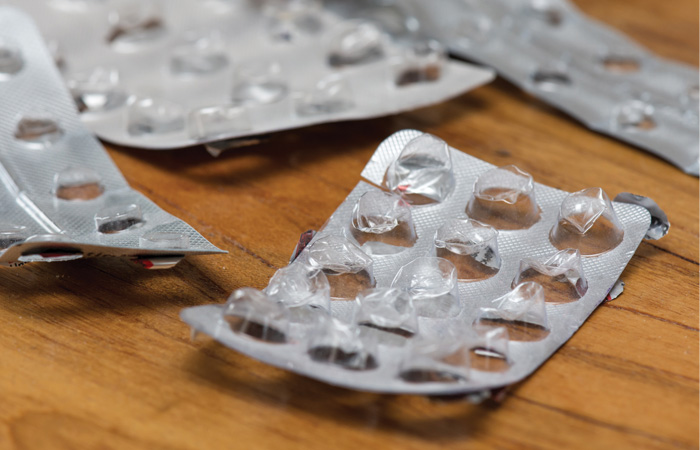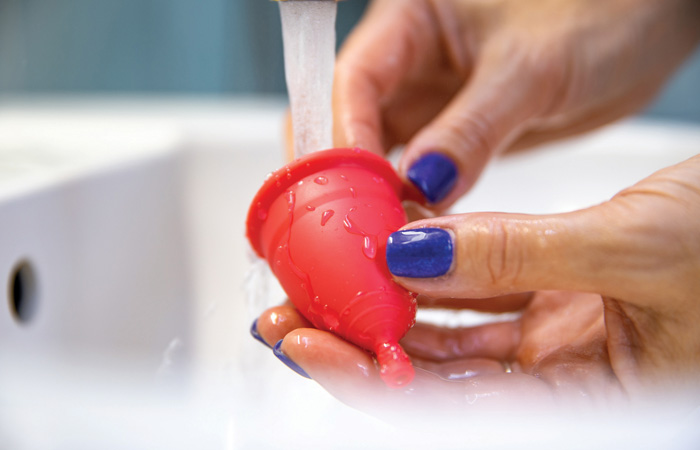In OTC
Follow this topic
Bookmark
Record learning outcomes
Very few people can say that they leave little trace on the planet. Inevitably, we are bound to leave behind evidence of our existence, but sustainability is about doing so at a rate that can be maintained, and does not cause severe harm to the environment, those around us, and future generations. The healthcare and pharmaceutical industry has an undeniable impact on the environment, but there are plenty of changes and habits pharmacy teams can implement immediately to lessen this impact.
Climate concerns
It may be difficult to recognise at first the effect pharmacy practices have on the broader environment, especially on issues like climate change. The thing is, healthcare and climate change actually share a symbiotic relationship. As the healthcare system greatly contributes to environmental imbalance, so too does that imbalance affect the public’s health, leading to a bigger demand on the healthcare system, an increased output and increased negative impact on the environment.
“The evidence showing the impact of climate change on the health and wellbeing of people across the globe is overwhelming; from the obvious impacts of air pollution on those with respiratory conditions, to the psychological impact of flooding and wildfires on victims,” says Katherine Watkinson, head of medicines optimisation and pharmacy at Turning Point UK. “Healthcare is a significant contributor to global carbon emissions, if global healthcare was a country, it would be the fifth largest emitter. Medicines, inhalers, and anaesthetics make up 25 per cent of the entire NHS footprint.”
The Royal Pharmaceutical Society (RPS) published its four Sustainability Polices in 2021, which covers improving prescribing and medicines use; tackling medicines waste; preventing ill health and improving infrastructure and ways of working. “This policy deliberately focuses on reducing environmental harm from medicines, rather than the wider climate and ecological emergency,” says the RPS.
The policies aim to guide pharmacy teams in the right direction, concentrating on pharmacy’s specific impact. “Whether you have an interest in sustainability or not, it is impacting every part of pharmacy practice and requires collective action to make meaningful changes,” says Katherine.
Pick a scheme, any scheme!
Making the following schemes accessible to customers can significantly improve the sustainability of the community. If it isn’t possible for your pharmacy to provide such schemes, at least making customers aware that they exist is a great place to start.
Blister packs are an inevitable part of the pharmacy, making it an excellent area to improve on. Pharmacies can partner with TerraCycle to receive a collection box to display in the pharmacy for customers to use, and list their location on an interactive map to allow customers in the area to find them easily. For each kilogram of blisterpacks collected in the pharmacy, 100 TerraCycle points are earned, which can be donated to a charity. Some pharmacy chains already have in-house recycling schemes, so teams should make sure they are informed and raise awarenesss with their customers.

Even if your pharmacy aren’t able to offer blister pack recycling, you can still signpost customers to their nearest cycling station.
While not yet available to install in pharmacies, TerraCycle runs a recycling service for contact lenses; the soft, disposable contact lens itself; the contact lens blister packaging and the foil from the blister packaging. Pharmacy teams can find the closest participating optometrist at: teracycle.com and encourage customers who purchase their contact lens solution in store to participate in the scheme, especially if they use daily contact lenses.
Needle exchange programmes are primarily concerned with preventing and reducing drug-related harms and transmission of blood-borne diseases. However, the programme also means the safe disposable of needles and syringes, as opposed to them being thrown into regular rubbish or littered. They can then be safely disposed of by the pharmacy. Where a local need for the programme is identified, pharmacies can apply to run this service – information for which can be found at: cpe.or.uk.
If not disposed of correctly, inhalers can be harmful to the environment. They should not be disposed of in household waste, as they contain potent greenhouse gases which can contribute to global warming. Pharmacies should encourage each customer they send home with an inhaler to return it to the pharmacy, where it can be properly disposed of. If there is an inhaler recycling scheme in the area, customers can be signposted there, too.
“Inhaler recycling schemes help reduce environmental harm by ensuring proper disposal,” says Elen Jones, Royal Pharmaceutical Society (RPS) director for Wales and director lead for sustainability. “Pharmacies can also promote safe medicine disposal, reduce paper waste through digital processes and adopt energy-efficient practices like LED lighting and planning transport routes to reduce travel time, fuel use and emissions.
“Pharmacy teams can explore the RPS Climate Change Charter (rpharms.com) for inspiration,” continues Elen. “It’s five core commitments help individuals and teams start to make their practice more sustainable and the suggested actions can be tailored to their own timescales, circumstances and ambitions.”
In line with the NHS’s promise to achieve net zero status, the RPS is also launching a Greener Pharmacy Toolkit in 2025 which teams can refer to. “[The toolkit] includes carbon calculators for measuring and lowering footprints, focusing on medicines supply, use and disposal,” says Elen. “This initiative will support teams in aligning with NHS net zero goals, tackling overprescribing and antimicrobial resistance while reducing health inequalities and air pollution.”
Every person involved in the healthcare system has a part to play in reducing its environmental impact. Pharmacy team members, crucially, have the ability to communicate directly with customers to improve their understanding of proper disposals, recycling and developing a conscious mindset towards which products they purchase, like reusable menstrual products.
“Pharmacy team members also have a vital role in educating patients and the public about the importance of only ordering the medication they need, the safe disposal of medication and providing advice and signposting to health and wellbeing advice which may prevent the need for medication,” says Katherine. “Everyone working in pharmacy is very busy and there isn’t the capacity for everyone to take on huge sustainability projects, but by every member of the team committing to embedding small changes in their practice, we can work together to deliver sustainable pharmacy services.”
“Around 200,000 tonnes of waste is generated each year from the disposal of single-use menstrual products”
Sustainable swaps
Another way to easily promote sustainability in the pharmacy is by stocking eco-friendly products. Customers may be surprised to find that there are re-useable, environmentally friendly replacements for many products. “Stocking and promoting eco-friendly products like reusable sanitary items and wooden toothbrushes can help reduce environmental impact and demonstrate a pharmacy’s commitment to sustainability,” says Elen Jones, Royal Pharmaceutical Society (RPS) director for Wales and director lead for sustainability. Below are a few examples of eco-friendly product swaps for the pharmacy.
Wood is good!
To start with, replacing plastic toothbrushes with wooden toothbrushes is an easy switch everyone can make. Wooden toothbrushes have a smaller carbon footprint than their plastic alternatives. Their production does not require the burning of gases, crude oil and/or coal which plastic toothbrush production does – plastic production releases toxic gases that can cause harm to all living creatures, impairs the human immune system and contributes to the worsening of health conditions like asthma. Some wooden toothbrushes can also be recycled, and many are becoming more biodegradable. They are also a similar price point to many plastic toothbrushes, so customers should not be put off by that aspect. Similarly, plastic Q-tips can be swapped for wooden ones, too.
Safe and sanitary
Sanitary products are a huge contributor to harmful waste. An an article by Envirotec Hygiene Services, ‘The Environmental Impact of Sanitary Waste: How to Minimise and Manage it’, noted that around 200,000 tonnes of waste is generated each year from the disposal of single-use menstrual products. “Most menstrual pads are made from 90 per cent plastic, which takes up to a thousand years to decompose in landfills or the ocean,” it claims. “Additionally, flushing tampons away has led to 1.5-2 billion menstrual items being flushed down Britain’s toilets each year, contributing to sewer blockages and environmental pollution.” There are a host of environmentally-friendly options when it comes to menstrual products. Re-usable pads, period underwear which can be washed and re-used, menstrual cups, and if customers still want to use tampons, a first step would be using organic tampons or all-cotton tampons which are compostable. Again, customers may be hesitant to purchase any of these products if they think the cost is too high, but pharmacy staff can explain to them that though the initial cost of purchasing a menstrual cup is higher, for example than tampons, a menstrual cup can be used every month for a number of years with no further cost, as opposed to the monthly cost of tampons or sanitary pads over the same time period.

Menstrual cups are available in varying shapes and sizes to suit customers’ preferences.
Say goodbye to single-use
Customers who use cotton pads to remove their make-up may be going through several daily, which has various implications for the environment. Cotton production requires large amounts of water and pesticides; cotton pads are often non-biodegradable, ending up in landfills; and purchasing of cotton pads means the accompanying packaging of single-use plastics. Switching to reusable make up pads made from bamboo, hemp and cotton blends means less plastic, less water being used and less waste in landfills. Reusable makeup pads can be handwashed or machine-washed on a gentle cycle, and will save customers money in the long run. Reusable make up pads only need to be replaced every 1,000 washes.

Customers can make sustainable swaps with ecofriendly items found in the pharmacy – such as for reusable makeup wipes.
Overprescribing
The overprescribing of medicines poses an issue with sustainability for the sector. “Around 25 per cent of NHS carbon emissions are from medicines,” says the The Royal Pharmaceutical Society (RPS) 2021 Sustainability Polices, which makes it all the more worrying that the number of medicines prescribed are increasing.
“Evidence shows that the number of items dispensed by primary care providers has doubled in recent years, from an average of 10 per person in 1996 to around 20 per person by 2020.”
For customers, a medicine may only last for a week, but the repercussions of its manufacture and disposal are far reaching. “Every stage of medication supply contributes to the healthcare carbon footprint,” says Katherine Watkinson, head of medicines optimisation and pharmacy at Turning Point UK.
“Before a medication arrives in the pharmacy, there has been a complex manufacturer process and each stage has an environmental impact, including the extraction of resources to make the product, the energy used to manufacture the product, the packaging which is often non-recyclable or difficult to recycle and transportation of the products. Once they are in the pharmacy there are challenges maintaining storage conditions with reliance on air conditioning systems and the need for secondary packaging.”
What can the pharmacy team do?
It is crucial that pharmacy teams are aware of potential overprescribing cases, and look out for them on a daily basis. When a customer comes in to collect a repeat prescription, make sure to discuss with them how the medication is going, if they feel they are still needing it, and if they are finishing the medication. Or, encourage customers to get their vaccinations so as to reduce the need for medication in the winter months.
Many customers may also be culprits of stockpiling medicines, so try to remind them that stockpiling can lead to waste when medication goes off or is forgotten about. Another way to reduce the impact of medicines wastage is to encourage the use of solid medicines like pills as opposed to liquids. Liquids are often not finished, which makes their manufacture, packaging and transport even more consequential. If they do not finish the medication, remind customers to return it to the pharmacy for proper disposal, and the same goes for all other excess medications.
“Once a medication is supplied to a patient it cannot be returned into stock. 63 per cent of medicines in the UK were discarded in household waste and 11 per cent were emptied in the sink or toilet, leading to medication traces being found in water supplies,” says Katherine. “Those medications which are not taken have the most negative environmental impact, as the environmental impact of the manufacture and supply has had no positive impact. Reducing overprescribing reduces the amount of medication needed and reduces the number of medicines which are wasted.”
By reminding customers of the importance of finishing their medicine courses, returning excess medicines and being conscious of the volume of products they are taking home each month, pharmacy teams can play a huge role in reducing the impact of overprescribing.


